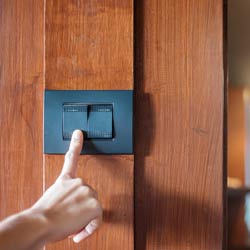In our increasingly environmentally conscious world, it’s important to reduce our ecological footprint and minimize energy consumption. Fortunately, there are many simple and inexpensive measures you can take to make your home more energy-efficient. In this article, we present 28 ways to save energy and money while making your home more environmentally friendly and comfortable.
- Seal gaps and cracks: Check windows, doors, and walls for gaps or cracks, and seal them with weatherstripping or caulk to prevent drafts and heat loss.
- Insulate your home: Proper insulation in your attic, walls, and floors can significantly reduce energy consumption by maintaining a comfortable temperature indoors.
- Use energy-efficient light bulbs: Replace old incandescent bulbs with LED or CFL bulbs, which consume less energy and last longer.
- Unplug electronics when not in use: Idle electronics still draw power, so unplug them or use smart power strips to cut off standby power. Also, don’t leave chargers plugged in when not in use, as they continue to draw power even when not connected to devices.
- Upgrade appliances: Energy-efficient appliances can save you money on your utility bills and reduce your home’s energy consumption.
- Opt for natural lighting: Open curtains and blinds during the day to utilize natural light, reducing the need for artificial lighting.
- Install a solar water heater: Solar water heaters use the sun’s energy to heat your water, saving energy and money.
- Hang clothes to dry: Air-drying clothes instead of using a dryer can save energy and prolong the life of your garments.
- Use cold water for laundry: Washing clothes in cold water reduces energy consumption by avoiding the need to heat water. Modern detergents are designed to work effectively in cold water, ensuring that your clothes come out just as clean as they would with a hot wash. In fact, cold water can even help preserve the colors and fabrics of your clothes, preventing them from fading or shrinking.
- Optimize your fridge: Keep your fridge full and clean the coils regularly to ensure it runs efficiently.
- Cook efficiently: Use the right-sized pots and pans for your burners, and use a microwave or toaster oven for smaller meals.
- Install a smart power strip: These devices can detect when electronics are not in use and cut off power, saving energy.
- Use window film: Apply window film to reduce heat gain during the summer and heat loss during the winter.
- Optimize water usage: Install low-flow showerheads and faucets, and shorten your showers to reduce water consumption. This saves energy, money, and conserves resources while maintaining comfort in your daily routines.
- Use energy-saving modes: Enable energy-saving features on electronics, such as sleep mode or eco-mode.
- Turn off lights: Turn off lights when you leave a room, and use timers or motion sensors to automate the process.
- Limit water heater temperature: Set your water heater temperature to 120°F / 50°C to conserve energy and reduce the risk of scalding.
- Invest in a home energy audit: A professional energy audit can identify areas where your home is losing energy and provide tailored solutions.
- Use a laptop instead of a desktop: Laptops consume less energy than desktop computers, making them a more energy-efficient choice.
- Install a solar power system: Solar panels can generate electricity for your home, reducing your reliance on the grid and lowering your energy bills.
- Choose energy-efficient windows: Energy-efficient windows can help reduce heat loss in the winter and heat gain in the summer.
- Install a smart thermostat: Smart thermostats can learn your schedule and preferences, optimizing temperature settings to save energy.
- Use blackout curtains or thermal blinds: These window treatments can help keep your home warmer in the winter and cooler in the summer by reducing heat transfer.
- Utilize area rugs: Adding area rugs to your floors can help insulate your living space and make it more comfortable, especially in rented homes with limited insulation options.
- Optimize your dishwasher: Only run your dishwasher with a full load, and use the energy-saving or eco mode if available.
- Use draught excluders: Place draught excluders at the base of doors and windows to prevent drafts and heat loss.
- Opt for rechargeable batteries: Replace disposable batteries with rechargeable ones, which have a longer lifespan and reduce waste.
- Cook in bulk: Cooking larger meals and freezing leftovers can save energy by reducing the need to cook multiple times.






